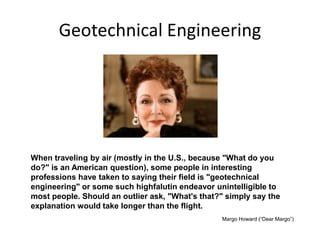Some Of Geotheta
Some Of Geotheta
Blog Article
Top Guidelines Of Geotheta
Table of ContentsSome Known Details About Geotheta The Definitive Guide to GeothetaGeotheta Can Be Fun For EveryoneNot known Details About Geotheta A Biased View of Geotheta

They perform website examinations, accumulate samples, execute research laboratory tests, and assess information to review the suitability of the ground for building jobs - Geo Tech Engineering. Based on their searchings for, geotechnical designers give recommendations for structure style, slope security, keeping frameworks, and reduction of geotechnical dangers. They work together with various other experts, such as designers, structural engineers, and building teams, to make certain that geotechnical considerations are incorporated into the total job design and application
By examining the habits and residential properties of soil and rock, they can identify potential geotechnical dangers such as landslides, dirt negotiation, or incline instability. Their know-how aids avoid failures or mishaps that might endanger lives and residential or commercial property. Right here are some thorough tasks and responsibilities of a geotechnical engineer: Site Investigation: Geotechnical designers conduct website examinations to gather information on subsurface conditions.
They analyze the data to understand the residential or commercial properties and habits of the soil and rock, including their strength, permeability, compaction characteristics, and groundwater problems. Geotechnical Evaluation and Layout: Geotechnical designers analyze the data collected throughout site examinations to analyze the stability and suitability of the site for building and construction projects. They carry out geotechnical estimations and modeling to review variables such as birthing ability, negotiation, incline stability, side earth stress, and groundwater flow.
Geotheta for Beginners
Foundation Style: Geotechnical designers play a crucial function in designing structures that can safely support the intended structure. They assess the soil problems and load demands to establish the appropriate foundation kind, such as superficial foundations (e.g., footings), deep structures (e.g (https://disqus.com/by/geotheta/about/)., heaps), or specialized techniques like soil improvement. They take into consideration elements such as settlement restrictions, birthing capability, and soil-structure interaction to establish optimal foundation styles
They assess building plans, screen website activities, and carry out field examinations to confirm that the layout suggestions are adhered to. If unforeseen geotechnical concerns arise, they assess the circumstance and offer referrals for removal or changes to the style. Risk Analysis and Mitigation: Geotechnical designers assess geotechnical threats and risks related to the job website, such as landslides, liquefaction, or soil erosion.

Cooperation and Interaction: Geotechnical designers work carefully with other professionals included in a job, such as engineers, structural designers, and building teams. Effective communication and partnership are necessary to integrate geotechnical factors to consider right into the general project style and construction process. Geotechnical engineers supply technological know-how, solution queries, and guarantee that geotechnical needs are met.
An Unbiased View of Geotheta
Right here are some kinds of geotechnical designers: Foundation Designer: Foundation engineers focus on developing and assessing foundations for structures. They analyze the dirt problems, tons needs, and find out this here site attributes to establish one of the most suitable foundation kind and style, such as shallow structures, deep structures, or specialized methods like heap structures.
They evaluate the variables influencing slope security, such as soil properties, groundwater conditions, and incline geometry, and create approaches to avoid incline failures and minimize threats. Earthquake Engineer: Quake engineers specialize in assessing and designing frameworks to stand up to seismic pressures. They assess the seismic threat of a website, examine dirt liquefaction possibility, and develop seismic layout requirements to make certain the safety and security and durability of frameworks during earthquakes.
They perform area screening, collect examples, and examine the gathered data to characterize the dirt buildings, geologic formations, and groundwater problems at a site. Geotechnical Instrumentation Engineer: Geotechnical instrumentation designers focus on monitoring and determining the habits of soil, rock, and frameworks. They install and maintain instrumentation systems that monitor elements such as dirt settlement, groundwater levels, incline motions, and structural variations to assess efficiency and give early cautions of potential problems.
Not known Facts About Geotheta
They carry out examinations such as triaxial examinations, consolidation examinations, straight shear examinations, and leaks in the structure tests to gather information for geotechnical evaluation and style. Geosynthetics Engineer: Geosynthetics engineers focus on the design and application of geosynthetic materials, such as geotextiles, geogrids, and geomembranes. They utilize these products to improve dirt security, enhance slopes, supply drainage services, and control erosion.
They have a tendency to be investigatory people, which suggests they're intellectual, introspective, and inquisitive. They wonder, methodical, logical, logical, and rational. Some of them are also social, suggesting they're kind, generous, participating, patient, caring, handy, understanding, sensible, and friendly. Does this audio like you? Take our complimentary profession examination to learn if geotechnical designer is among your leading career matches.
In the workplace setting, geotechnical designers utilize specialized software tools to carry out calculations, develop styles, and assess information. They prepare reports, evaluation task specifications, connect with clients and employee, and coordinate project tasks. The office setting gives a favorable setting for research study, analysis, and collaboration with other professionals associated with the project.
A Biased View of Geotheta
They often see job websites to conduct website examinations, examine geotechnical problems, and gather data for evaluation. These sees include taking a trip to different areas, sometimes in remote or difficult surfaces. Geotechnical designers may do dirt sampling, conduct examinations, and monitor building and construction activities to make certain that the geotechnical elements of the project are being applied correctly.
Geotechnical engineers additionally work in specialized geotechnical research laboratories. In these facilities, they carry out experiments, do examinations on soil and rock samples, and analyze the engineering homes of the products. Geotechnical research laboratory engineers work extensively in these atmospheres, taking care of testing tools, running instruments, and tape-recording information. They team up with other lab personnel to guarantee exact and dependable screening outcomes.
Report this page